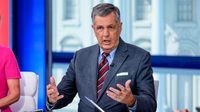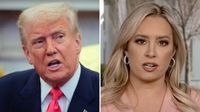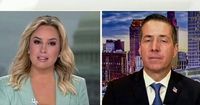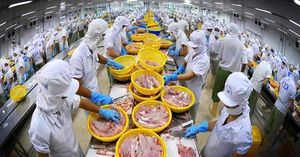In a notable confrontation this week, President Donald Trump publicly criticized Jacqui Heinrich, a leading correspondent for Fox News, following her pointed questions during a recent interview about his administration's actions and policies. The exchange highlights ongoing tensions between the president and the media, particularly in light of Trump's renewed scrutiny of news outlets he perceives as critical of his administration.
On March 19, 2025, Trump took to Truth Social to express his discontent with Heinrich's reporting, stating, "I watched Jacqui Heinrich from Fox over the weekend and I thought she was absolutely terrible. She should be working for CNN, not Fox." This critique came on the heels of Heinrich's inquiries regarding Trump's promotion of Tesla electric vehicles at the White House, as well as implications about his relationship with Russian President Vladimir Putin.
Heinrich, who serves as the Senior White House Correspondent for Fox, had recently asked Senator Bernie Moreno whether showcasing Teslas at the White House was "an appropriate thing for the president to do there?" She further queried Trump’s national security advisor, Mike Waltz, whether Trump was potentially being "played" by Putin. Waltz, appearing unamused, responded to this suggestion as "almost laughable," asserting confidence in Trump’s dealings with foreign leaders.
Brit Hume, a longtime Fox News political commentator, came to Heinrich's defense on the social media platform X, asserting her capability as a journalist. Hume remarked, "I watched her too. She plays it straight, covering both sides of a story and has certainly played fair with you. You may have a case against some White House reporters, but not @JacquiHeinrich." Hume’s remarks underscored the division within the media landscape where reporters often find themselves navigating pressures from political figures and their audiences alike.
The incident is part of a broader pattern as Trump has increasingly turned his ire towards various mainstream media outlets since returning to office. This latest episode speaks to his selective criticism; while traditionally supportive of Fox News as a favorable outlet, he nevertheless targets specific journalists who he feels do not align with his narrative or those who challenge his administration. In recent months, Trump has diminished his public outcry against Fox, instead choosing to grant exclusive interviews to its hosts.
Moreover, the Trump administration is currently embroiled in a legal battle with The Associated Press related to journalist access to the White House. This struggle stems from the news wire's unwillingness to adhere to Trump's preference for referring to the Gulf of Mexico as the "Gulf of America." Such disputes illustrate a growing friction between the press and the White House, indicative of a wider cultural encapsulation of media relationships under the current administration.
Heinrich's critical stance has not gone unnoticed; it reflects a trend where reporters are increasingly holding the administration accountable for its policies. During her questioning, she highlighted the potential impacts of Trump's trade strategies on everyday Americans, stating that many would face financial difficulties due to a tariff war that could hinder their 401(k) accounts.
This kind of journalistic inquiry is increasingly seen as a necessary counterbalance to political discourse that might otherwise avoid deeper scrutiny of administration policies. While Trump’s criticisms of Heinrich may resonate with his supporters, it also raises essential discussions about the role of the media in democracy, particularly regarding holding leaders accountable and providing the public with essential information.
As of now, the White House has yet to respond to Hume’s defense of Heinrich or to elaborate on the president’s disparaging comments. What remains clear is that the dynamic between Trump, Fox News, and its correspondents continues to evolve, illustrating the complexities of media in a politically charged environment.
The backdrop of this scrutiny also includes Trump’s decision to showcase Tesla vehicles while his administration battles economic scrutiny and declining stock prices, particularly amidst criticisms surrounding the company’s billionaire CEO, Elon Musk. The tension between promoting American innovation and addressing the potential fallout of trade policies showcases the challenges of governing in a highly interconnected global economy.
With Trump’s announcement to buy a Tesla as an act of confidence in Musk, the conversation surrounding the implications of his administration’s trade policies and their effects on American consumers remains vital and ongoing. It exemplifies the delicate balance politicians must maintain—balancing promotional acts with the realities faced by the electorate.
In summary, this incident not only reflects personal tensions but also embodies broader national conversations about the relationship between the press and the presidency. As critics continue to grow and question policies and behaviors, the responses from both sides remain crucial in shaping public perception and discourse.









